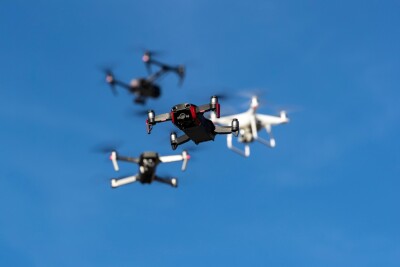Businesses across the drone industry are working to figure out how to function remotely, but those who offer training and education for this sector are doing the same. Some are having more trouble than others, but the program offered by Embry Riddle Aeronautical Universities Worldwide Campus turns out to already have been incorporating many distance-learning elements that have become that much more relevant for students during the coronavirus pandemic.
Christian Janke is an Assistant Professor at Embry Riddle Aeronautical Universities Worldwide Campus and Program Chair for the Bachelor of Science in Unmanned Systems Applications. The Bachelor of Science in Unmanned Systems Applications (BSUSA) offered by ERAU focuses on the growth, innovative development, and effective use of unmanned system technology across the respective domains (air, space, ground, and maritime).
I connected with Christian for a video interview to learn more about the distance-learning elements of the ERAU program, but bandwidth limitations didn't give us a usable video. Thankfully, I was able to utilize the audio from the conversation to capture his thoughts around where things are with drone regulation across Europe, what distance-learning looks like at ERAU, what role training will have in the future of the industry and more.
Jeremiah Karpowicz: It's been a little while since we talked about drone regulations in Europe, but there was much rejoicing with the common rules for the use of drones that EASA published last June. However, so much has changed since then, so can you give us a sense of where drone regulation in Europe is right now and where we're headed with it?
Christian Janke: As you heard, there was a proposal from the European Aviation Safety Agency (EASA) to harmonize European drone rules and that was supposed to go into effect in all member states by July this year. Given the new circumstances with the pandemic, that timeline is a bit ambitious.
The common rules and harmonization involve not only a European-wide registration of aircraft but also mutual recognition of drone pilot licenses and the same rules for operations in the open and specific categories. All of the member states would need to make that domestic law since it is European regulation. After the publication, the legislation won't go into effect for a year, and that period ends in July. It's looking like we'll have to wait for that though.
Nevertheless, some countries and member states are thinking about certain opt-outs. They might have a domestic registration database, their own rules for specific sovereign acts like flying over people, flying at night, and beyond visual line of sight operations. That is a very critical topic related to the sovereignty of the domestic aviation system and the Civil Aviation Authority. So I'm very curious about how this will play out.
It's unfortunate as this is a topic we've been talking about for a long time. There was a great deal of enthusiasm around how this would provide commercial operators across the continent with some rules they could define for themselves and their business, but I suppose that's what happens when we're dealing with such incredible uncertainty.
It's complicated on multiple levels.
Just take registration. There are countries such as Germany, where there's no registration database and there's only the rule that you have to have the drone marked. We have no idea how many drones are flying in Germany because there is no database.
Many other countries such as the UK and Spain and Italy have registration databases not only for drones but also for pilots. There are also different rules in countries around beyond visual line of sight for example, in uncontrolled airspace and controlled airspace. So it's different from Poland to Portugal and depends on the Civil Aviation Authority.
In Germany, where I live, we have state-level agencies, so there can be slightly different rules in northern Germany and southern Germany. It's all very complicated. Sorting all of that out for operators is critical, but it's also important for the opening of the new drone market.
That process is going to see companies sort through an entirely new reality, but that's a process I've heard you're going through as well as the ERAU Worldwide Campus with your distance-learning program? What's the background of the program, and how quickly did the distance-learning aspect of it come together?
Embry Riddle Aeronautical University has two residential campuses in Daytona Beach, Florida, and Prescott, Arizona. ERAU also has a worldwide campus which has a long history of distance and distance learning, which started not online, but in a time when lectures were being sent around on VHS cassettes. We were the first to turn online and now we have a very sophisticated and distributed campus system where the students really can work through their degree program in many different aviation-related fields.
In my case, I'm the Program Chair for the undergrad Bachelor of Science in Unmanned Systems Applications program. The majority of my students are located worldwide and studying mostly online where it's possible. In most cases this is possible, but when it comes to something like the practical flight exam, for example, for a drone pilot license, that is something we need to do in person.
So, for the Worldwide Campus, this was a smaller transition. Our residential campuses were a bit more affected. The flight schools and presence classes have been even more impacted, but they have also shifted online, where possible. We work together as one Embry Riddle Worldwide team.
Wow, I hadn't realized the ERAU Worldwide Campus already had such a strong distance-learning element associated with it. With that being the case, I'm guessing you had some insights and advice to share about with students and colleagues from the Daytona Beach and Prescott campuses about what successful distance-learning could look like.
Yes, we have and continue to help each other out. We are in the process of transitioning a lot of the opportunities and programs online. We are also offering other opportunities such as webinars, online training, professional education, and also a massive open online course (MOOC). ERAU has been offering that for years now and it covers numerous topics. These topics range from sustainability to aircraft accident investigation, or in this case, STEM. We're about to launch a massive online course directed to teachers and educators looking to teach and learn about STEM topics.
Registration link: https://www.canvas.net/browse/erau/courses/enhancing-stem-education-with-drones
Just like everything else, education is changing before our eyes, so can you talk a little bit about how your students can get to the same place or achieve some of their goals when they're taking distance-learning courses in the same way as they would if they were in a physical classroom?
No matter what kind of program you're talking about, the issue always comes down to balance. So many students need to balance their classwork with a full-time job and with their family duties and not all of our students can get to the campus every day. Many of our students work full time and study in parallel, so they work in the evening and on the weekend, so distance-learning can be something that is very beneficial for someone in mid-career and is transitioning to a new phase in his or her life.
Certainly, the degree programs at the Worldwide Campus are all related to aviation but also deal with upcoming topics that are related to it, such as cyber-security, maintenance, safety, and Unmanned Systems. These programs are accredited in most cases and if it's a new program, we're working on that accreditation. That's why future employers and graduates are very satisfied with the results. We have a very high job placement rate in the first six months after graduation. So there is a measurable success, which is imperative because it is also a very meaningful investment from students.
So how has the training and education students receive in the program specifically prepare them for what they're going to face in the job market?
It happens in very defined ways.
In my program, we have three specializations that we call tracks. Those tracks are Administration, Operations, and Development. Someone in the Operations track would be a person who would start his or her own business or work in a larger company as an in-service provider using sUAS and drones.
There's a lot of demand for the Administration track worldwide, from authorities, the insurance industry, and state entities. This technology is driving a great deal of interest, so many domestic civil aviation authorities need skilled and trained personnel that know about drones, unmanned systems, robotics, and the connected regulation.
The Development track would be applicable e.g. for manufacturers. There are a lot of manufacturers that need skilled workers and people who can work in engineering and develop new products that deal with battery technology, propulsion, and many other things.
We assess and identify what the market needs and talk to potential employers, get feedback from alumni and graduates to adapt our programs to maintain current learning outcomes.
And where are you graduates finding these jobs? Are they mainly in Europe or any other region of the world?
It's across the world. It depends on where graduates want to work and live. If you look at the job openings posted on a variety of networks and sites, the people who are hiring are looking for candidates from anywhere and everywhere. So it's more about the graduates and what they want to do.
It's not only America and Europe that we're seeing these postings, as plenty of our graduates are finding work in Africa and the Asia Pacific region. Many companies are looking for specialized and skilled employees and we are helping our students and graduates become employed in this very much growing field.
If there's one thing you want people to know about the role that that education and training is going to play in the drone industry, both in the short term and in the long-term, what would that be?
Everyone who operates a drone needs to be aware of the fact that this is related to aviation. If you're flying a drone you are participating in the airspace and that means that you need to follow certain rules. I believe that no matter what their background might be, for anyone operating a drone, training is very important and it should always relate to the achievements and learnings from manned aviation when it comes to safety and risk assessment and professionalism. We call it "Airmanship" and it's a very important thing to follow.
Drones and manned aircraft will share common airspace soon in both controlled and uncontrolled airspace. Training is very important to ensure that mutual recognition of how to operate safely in this environment both in terms of learning what that means in the classroom as well as out in the field.















Comments